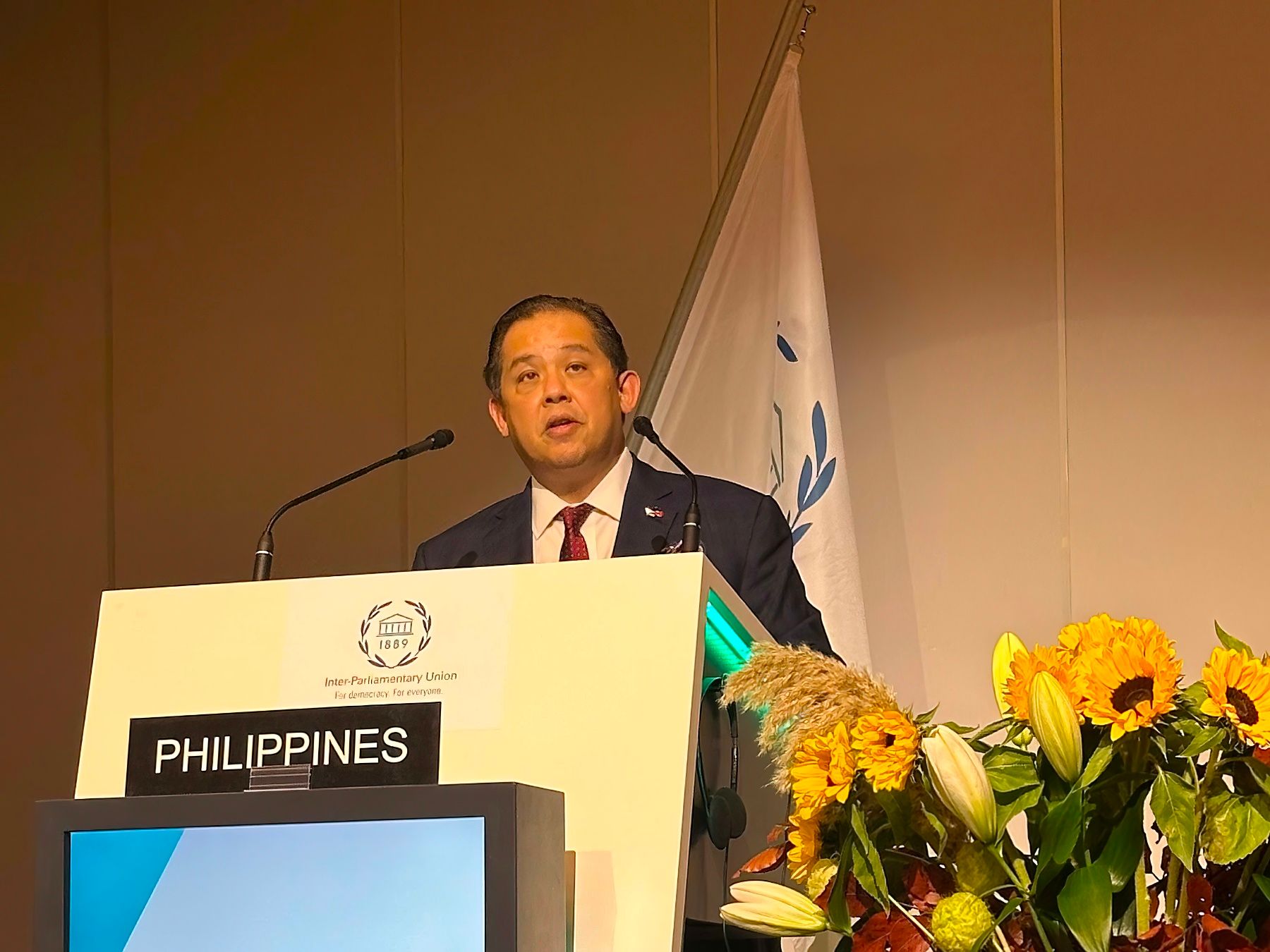Romualdez boasts Philippine progress in science, technology, and innovation under Marcos
At A Glance
- House Speaker Martin Romualdez has trumpeted the fruits of President Marcos and Philippine Congress' efforts in promoting science, technology, and innovation in the country.
 House Speaker Martin Romualdez (Speaker’s office)
House Speaker Martin Romualdez (Speaker’s office)
House Speaker Martin Romualdez has trumpeted the fruits of President Marcos and Philippine Congress' efforts in promoting science, technology, and innovation in the country.
Romualdez did so in a speech at the 149th Inter-Parliamentary Union (IPU) Assembly in Geneva, Switzerland on Monday night, Oct. 14.
"The Philippines’ Global Innovation Index has been increasing over the last decade. In fact, the Philippines is recognized as one of the middle-income economies with the fastest innovation catch up,” Romualdez told his IPU audience.
He emphasized the importance of science, technology and innovation in addressing issues that developed and developing nations are facing.
“The complementary, interdependent nature of these three different concepts means that they must be considered as one: together. Science, technology and innovation serve as our guiding lights of hope,” the Speaker said.
“They are our tools in addressing some of the most pressing issues we have today. They support us in achieving our sustainable development goals and in shaping future peace. They hold vast potentials to form and drive global solutions to the world's problems,” he underscored.
They are also “key drivers that enable and accelerate the global transformation towards prosperous, inclusive and environmentally sustainable economies in developing and developed countries alike.They are the pillars of sustainable development,” the House leader added.
“They have the strong potential to contribute to the achievement of almost all the sustainable development goals. They are the heart of international cooperation and global partnerships for development,” stressed Romualdez, arguably Marcos' top lieutenant in the legislature.
In line with the legislative priorities of the President, Romualdez said the National Innovation Council was created “to ensure that innovation is embedded as a key priority in our country's pathway to socio-economic development".
He said the council, chaired by the President, administers a 10-year policy vision, goals, and strategies, collectively referred to as the National Innovation Agenda and Strategy Document.
The document contains the Philippines’ vision and long-term goals for innovation and a road map of the strategies for improving innovation governance, deepening and accelerating innovation efforts, and integrating and fostering public-private partnerships, mindful of the policy of "leaving no Filipino behind,” he said.
Romualdez, who headed the Philippine delegation to the IPU Assembly, informed his fellow lawmakers and parliamentarians from all over the world that the Philippine Congress--in support of the 2030 Agenda for Sustainable Development--has enacted several measures to improve innovation governance in the country.
He specifically mentioned three laws: Republic Act (RA) No. 11293, also known as the “Philippine Innovation Act"; RA No. 11927, or the “Philippine Digital Workforce Competitiveness Act"; and RA No. 10055, or the “Technology Transfer Act of 2009".
Speaker Romualdez said the initiatives taken by the President and measures enacted by Congress have “borne dividends for our country".
He said in the 2024 Global Innovation Index of the World Property Organization, which measures the innovation-based performance of 130-plus economies, the Philippines rose in the ranking from 59th in 2023 to 56th place this year.
In the same report, the Philippines was recognized as one of the decade's top innovation performers, having achieved its highest rank at 50th place in 2020 during the global pandemic, he said.
The Digital Workforce Competitiveness Act aims to address gaps in digital technology and skills by providing programs that equip Filipinos with the necessary competencies for the global labor market.
The law ensures support for the digital workforce through co-working facilities and loans with concessional terms.
It also allows for public-private partnerships to plan and implement training, skills development and certification programs for digital careers.
The Technology Transfer Act seeks to promote and facilitate the transfer and commercialization of intellectual property, technology and knowledge resulting from research and development programs funded by the government for the benefit of the Philippine economy.
Under the 2023-2028 Philippine Development Plan, the government has emphasized the importance of innovation in achieving deep socioeconomic transformation.
The Department of Science and Technology (DOST) launched PAGTANAW 2050, the first DOST-funded inter-disciplinal and trans-disciplinal project on a Philippine-focused Science Technology Innovation Foresight and Strategic Plan.
The plan is a compendium of science, technology and innovation mega trends, global and national societal goals, trans-disciplinary operation areas, and current and emerging technologies relevant to the nation's development that is firmly grounded in the aspirations of Filipinos.